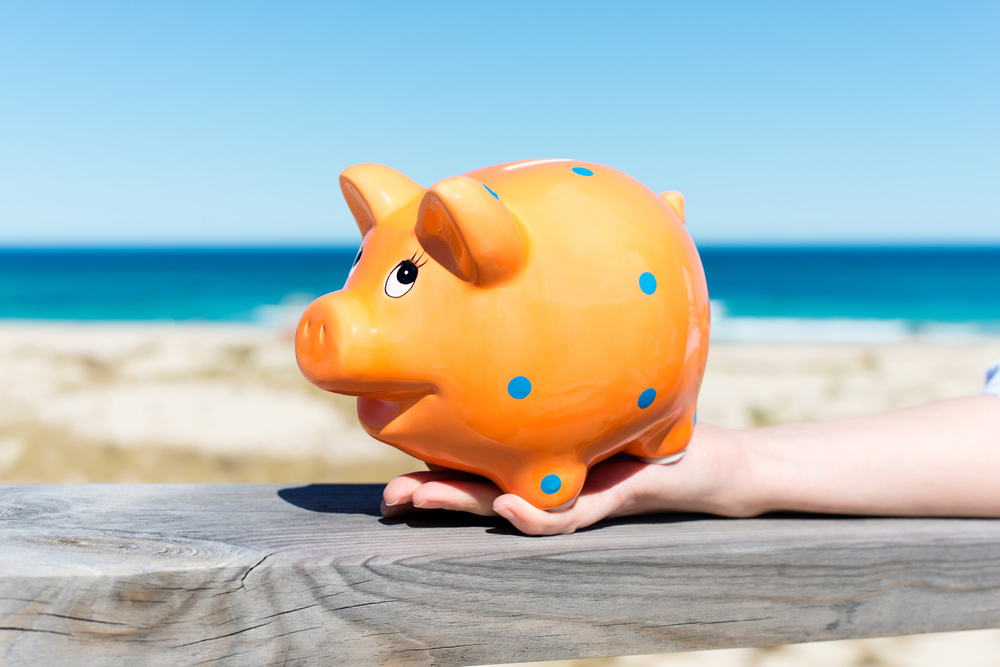Travel Week: 10 Money-Saving Travel Tips
Taking a trip this season or planning one for the future? Here are ten tips that'll help you save money on travel and get the most out of your experience.

1. Set a Budget
The best way to travel on a budget, is by actually having a travel budget. Consider first your overall budget. If you're struggling to get by month to month financially at home, then you might want to step back and figure out your money matters before even thinking about a dream vacation. (We have some great tools to get you started.)
If you're doing rather well, aren't having much of a problem paying your expenses, and have enough to put into savings month to month, then figure out just how much you're comfortable spending on a trip. You'll want to make sure you'll be able to pay the bills the month that you leave and have enough left to get you by comfortably when you come home. Determine how much you can spend without stressing out and stick to that budget. That might mean having to wait awhile to take your trip, or shorten your trip, or even reconsider where you go.

If you're comfortable borrowing money to help out, or to have just as an emergency fund (which is a good idea), sit down with your financial institution* and explain what your plan is - they can help you figure out the best option (loan, line of credit, credit card, etc.)
* Always, always let your financial institution know when you'll be traveling out of state so they can mark your account. This will prevent it from being frozen for any "suspicious activity" when you use your card or try to make ATM withdrawals across state lines and country borders.
2. Research + Estimate Your Overall Expenses Early On
If you're taking a road trip, how many miles will you be traveling? You can estimate how much you'll spend in gas money with this calculator. If you're flying, how much is the cost round-trip? Start looking into hotel rooms, hostels, and taxi/bus/train fares, too. You can enter your dates of travel and get an idea of what you'll be spending. Even estimate how much you'll be spending on food and souvenirs.
Several travel review sites and discussion boards exist that might offer some insight on cheaper areas of the city to stay in, eat at, and so on. Don't forget to look into travel discounts for students, military, and seniors, too. Looking into all of this will help you further determine your budget.
3. Use Your Connections
If you can crash on a couch or the floor of a friend (or friend of a friend) or family member's place in a cool city, you'll have far more to spend on actually experiencing the area.
4. Take Advantage of Price Comparison Travel Sites
Sites like Skyscanner and Cheapoair scour the web for the cheapest flights available for you - but sometimes they don't mention hidden fees and extra costs that will hit you later. Use sites like these to do the initial price search, then visit the actual airline's website that shows the cheapest fare. If it's far higher than what the price comparison site says, you can always give the airline a call and mention the price you saw and ask what the lowest price they're really offering is.
Other sites, like Expedia and Orbitz are great because they'll not only find the most affordable flight, but also offer package deals (rental cars and hotel bookings, too.) Always, always double check rates on the actual airline, car rental, and hotel websites, though, to make sure you're getting the best deal - and not getting scammed!
5. Book at the Right Time
Experts agree that 6 to 8 weeks out is the best time to purchase airline tickets.

Photo via AngiesList.com.
You'll also want to make sure you book places to stay in advance, so you'll be guaranteed a place to stay in the area that you actually want to be in, and if you arrive to your destination early, they can usually hold your luggage for you at the desk, even if it's too early to check-in. (Hauling a 60 pound backpack around a hot, crowded city for hours on end is not fun.)
6. Map Out Your Adventure
Or at least narrow it down. This doesn't mean you can't accomplish everything you want to do, but on a financial level and on a you'll-get-more-out-of-it level, you might want to really start to consider where it is you want to go and what it is you want to see. If you're heading to Europe, for example, there's a lot to see and, although the rail and bus systems are wonderful, there is still a lot of travel time between each place if you don't rent a car. Not a huge deal, unless you're short on time.
It's also helpful to find out just how much time you'll dedicate to travel and build an itinerary. How much time will it take to drive, travel by train, or fly to your next location on the trip? What time will you take off from one place and when should you leave the next? If you're not a fan of set itineraries, it's still very wise to construct a rough outline of your journey - just so you don't miss out!
Also, research where you should start and end your journey - that is, will you be flying out from the same city you flew into? Discussion boards are great for this, as well as trip planners.
7. Find Free Stuff to Do
Believe it or not, most places you visit will have a long list of free experiences. Try planning your trip around a festival or event. Visit the city's website and social media pages to stay in-the-know about what's going on. Snag a travel book at a secondhand bookstore (even if they're outdated by a year or two, you'll get a pretty good idea of what to look out for.)
Having a map on hand and research printed out can make being your own tour guide easy, fun, and free. You can easily find maps of the cities you'll be visiting, sometimes specific to the landmarks and places you want to see. (Heading to Los Angeles? Try searching for "Popular must-see film destinations in LA." New York? Try "Map of New York's top attractions." London? Search for "Self guided tours of haunted London.")
8. Live Like You're at Home
Yes, vacation means enjoying yourself and immersing yourself in the culture sans dishes or grocery trips. But if putting up with some of that means a few hundred dollars saved, then maybe you'll reconsider. Try eating out only once or twice a day and swing by the nearest grocery or farmer's market for your other meals and snacks, or pre-pack them. If you're staying in a hostel, they'll often have shared kitchens where you can not only prepare food, but also meet a lot of fellow travelers (and maybe a few new friends!)
If you wouldn't spend an arm and a leg on something at home, then don't go crazy just because you're on vacation. Try to focus on the experience and memories, not the costly add-ons.
9. Bring a Friend
Some trips are best taken alone. It allows for you to do exactly what you want, when you want, and serves as an opportunity to really take it all in. But traveling with friends and family can also prove to be an incredible time. It makes for extra memories and bonding time, as well as a little more confidence and security. Just be prepared that traveling in pairs or in groups might mean you don't always get what you want, so choose someone you feel totally okay being honest with during your travels.
Traveling in a pair or group may also be more affordable than going it alone. You can split the cost of hotel rooms and taxi fares, share a meal when you eat out, and have (hopefully) a voice of reason when it comes to spending.
10. Embrace the Unexpected
Last but not least, be okay with the hiccups that may happen on your journey. (This is where an emergency fund might come in handy.) Your flight may be delayed, you may miss the train or take a taxi when you weren't expecting to, you may not get to see everything you set out to see, but your focus should be on what you did experience and what you are experiencing.

Embrace the fact that you're seeing the world and growing because of it. At the end of the day, jot down three things that had you feeling wonderful that day, and maybe one that didn't. Then, take a deep breath, learn from it and get on with discovering this incredible Earth.
Happy travels, readers!
